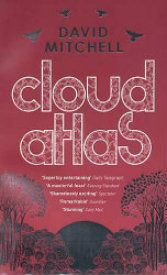I saw this meme over at
Howling Frog Books (it was originally created by Melissa at
Harley Bear Books), and it looks like fun, so I think I'll play. Here's how it works:
1. Pick a number.
2. Go to your bookshelf and count that many books until you reach your number. Answer the question with that book.
3. Count the same number of books from where you left off and answer the next question.
4. Repeat until you finish the survey
I chose the number 10, and found every tenth book from my biggest literature bookcase. (I don't know why the spacing is wonky below, and I can't seem to fix it, sorry!)
1. Sense and Sensibility by Jane Austen: What do you think of the cover?
I love this cover. Many of my classic literature covers have paintings from the relevant period, and this one is well chosen. The slimmer, more erect girl on the left is obviously sober Elinor, and the lounging, plumper, tousle-curled girl on the right is emotional Marianne.
2. The Book of Sand and Shakespeare's Memory by Jorge Luis Borges: Write a review in 140 characters or less.
Two dreamy, hypnotic, fascinating, inventive story collections from late in Borges' life.
 3. The Lady With the Dog and Other Stories by Anton Chekhov: How or where did you get this book?
3. The Lady With the Dog and Other Stories by Anton Chekhov: How or where did you get this book? I got it from Amazon, because I wanted to read "The Black Monk," which
is one of the stories in this collection. I was a little disappointed
because I thought it would be a creepy/gothic type of thing, but it was
more about madness, which I should have known given the author.
 4. Great Expectations by Charles Dickens: Who's your favorite character in this book, and why?
4. Great Expectations by Charles Dickens: Who's your favorite character in this book, and why?
Joe Gargery. He has such sweetness and dignity, and no pride or resentment.
 5. The Adventures and Memoirs of Sherlock Holmes by Sir Arthur Conan Doyle: Recommend this book to a fellow blogger you think would like it.
5. The Adventures and Memoirs of Sherlock Holmes by Sir Arthur Conan Doyle: Recommend this book to a fellow blogger you think would like it.
Actually,
this kind of stumps me. I've never seen Sherlock Holmes books reviewed
on a blog, nor detective fiction, on the blogs I mostly frequent.
6. The Small Boat of Great Sorrows by Dan Fesperman: How long ago did you read this book?
Probably three or four years ago, I don't remember exactly. It was a used-bookstore find, a thriller with a postwar Sarajevo setting that appealed to me.
7. A Farewell to Arms by Ernest Hemingway: Name a favorite scene from this book (NO SPOILERS).
I read this book in high school (!) which is so long ago that I barely remember it. Only one scene remains in my memory, so it must be my favorite--the childbirth scene, with Catherine having dreadful pains and sucking on the "gas" that they gave to laboring women at the time. It terrified me.
8. The Betrayal of Trust by Susan Hill: Open to page 87 and pick a random quote to share (NO SPOILERS).
"She had--an expression. Happy. You don't see people look happy, just plain happy, do you? They look worried, they look worn down, they're frowning, or maybe laughing out loud... but this was--just happy. I remember it."
9. An Artist of the Floating World by Kazuo Ishiguro: How did you hear about or discover this book?
The Houston Museum of Fine Arts has a book club of sorts. They announce a book on their website, you read it, and then go in for a tour, which they have tailored to the book. This book is about a painter in postwar Japan, and the tour included a lot of Japanese art, with a docent-led discussion of both the art and the book.
10. Strange Tales by Rudyard Kipling: If you could redesign the cover, what would you do?
I'd make it more like the cover of the book that I have, which is not the one shown. The one I have is a Wordsworth Edition, Strange Tales series. it has what looks like a pencil drawing called "Death shakes the dead leaves" by Robert Mathias. A skeleton is hanging on to a tree, a wind is blowing, leaves are flying, and both tree and skeleton are bowed. It's eerie and fabulous.
11. To Build a Fire and Other Stories by Jack London: Name your least favorite character in this book and why.
The title story in this collection is the only one I've read, and it has two characters--a man and a dog. I'd have to say the man is my least favorite character, because he makes some
really bad decisions.
12. Chronicle of a Death Foretold by Gabriel Garcia Marquez: If you like (fill in the blank), then you should try (your book).
If you like magical realism, Spanish literature, or explorations of the dark side of human nature, you should try this book.
13. David Golder by Irene Nemirovsky: Name one cool thing about this book (under the dust jacket, map, font, photograph, etc.).
What I like about the edition I have (pictured) is that it's one of the set of Nemirovsky's books published in Britain by Vintage. The US-published ones look different. I found this one in a used bookstore. They all have the title in that swirly font, and a swoony period photo. I love them.
14. 1984 by George Orwell: Where is it set, and would you ever want to visit that world/place?
The dystopian future, and good Lord, no.
15. All Quiet on the Western Front by Erich Maria Remarque: Who is it dedicated to?
It's not specifically dedicated to anyone, but it has this rather moving paragraph before page one: "This book is to be neither an accusation nor a confession, and least of all an adventure, for death is not an adventure for those who stand face to face with it. It will simply try to tell of a generation of men who, even though they may have escaped shells, were destroyed by the war."
 The Mount TBR Challenge attracted me this year as a way to chip away at my massive TBR list--the books I own but haven't read. I attempted to read 12 of those books this year, and alas, it looks like I only read eight, while continuing to purchase new books. So much for whittling the list! The books I read were:
The Mount TBR Challenge attracted me this year as a way to chip away at my massive TBR list--the books I own but haven't read. I attempted to read 12 of those books this year, and alas, it looks like I only read eight, while continuing to purchase new books. So much for whittling the list! The books I read were:










































